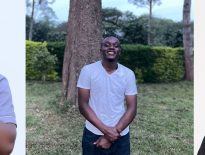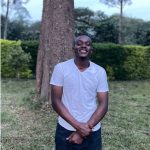As I sit in front of my computer, I ready myself to write. The writing journey starts with me tasting the words as they pop from my mind and roll onto my tongue. They whisper, “Write me down.” However, often, I’m like those vintage cars that require cranking to get going. Sometimes the spark ignites, propelling me forward, while other times I’m just but an old dead battery. Yet, when I’m charged, my fingertips dance across the keyboard, and I liberate the words to drift into the world. They tell stories I thought I had long forgotten. I type fast without pause, fearing that if I pause, it might invite writer’s doubt to assume citizenship in my mind and leave me bereft of words. What else does my writing do besides making me, at times swim and sometimes drown in words?
My writing often catapults me right back to my childhood. It was a harsh world to grow up in, replete with trauma and set in the lap of poverty. Despite these circumstances, love and happiness, nevertheless, lived with us. As a child, I ignored the traumatic things, and frankly, back then, our tongues were unacquainted with the word “trauma” since we thought it was synonymous with “life.” The words that flowed from our tongues effortlessly were laughter and happiness since these words are so easily explained—or so I believed. However, the brain is a strange organ—happiness leaves little foottracks, whereas trauma carves deep ravines. One day in your adulthood when you casually meander down ‘happy lane,’ and all of a sudden you find yourself plummeting into a dark abyss, that’s when the words vanish—precisely when words are the only thing that could serve as ropes to rescue you.
Nashipae – A Creative Nonfiction by Beth Ruga, Kenya
My writing takes me back to a time when my dad once won big by betting on one or other horse races. This windfall allowed for a luxurious treat for our whole family – an entire barrel of Kentucky Fried Chicken and sides. As I pen this, I realize those KFC moments are forever etched in my mind. Closing my eyes, I can still vividly see my family digging into that Kentucky crispy delight as if it happened yesterday. I remember Colonel Sanders smiling at me from the KFC box. KFC’s secret recipe aroma swirling in the kitchen as my brothers and sisters joyfully stuff their faces with fluffy marshmallow-like white rolls, KFC chicken, and sweet coleslaw and slurping up the soft mashed potatoes crowned with gravy. This simple memory floods me with happiness, and I only want to write about these moments.
Yet, as a novice in the English language and writing, like any beginner, I excitedly blunder along while making exciting discoveries at every turn. In my youth, I was a voracious reader and swallowed the words quickly as a means of escaping my then reality and dreaming of another world that I had not yet set foot upon. Now, it is different. I read in slow motion by embracing words and stories. Literature no longer serves as mere escapism but rather an enriching force that liberates me from the confines of everyday adult life. It enables me to walk through this world in a state of awe, at times wowed by people—how they think, how they speak, and how they relate to their surroundings. Often times I just soak up the words that spill from their mouths. Their utterances provoke deliberations and contemplation at times. Occasionally, they spark a wide-eyed, open-mouthed response, or at times elicit tears, but mostly they evoke wonder.
More Than a Reality, Our Reality – A Creative Nonfiction by Akoth Otieno, Kenya
My mother tongue gracefully curls around Afrikaans words, whereas the English language remains an unfamiliar territory and often requires me to juggle English words with my tongue until they fit. I repeat words like, “ac-cen-tu-ate,” “phe-nom-e-no-log-i-cal,” “ve-ra-cious,” and such words over and over until my tongue acquiesces. I seek help from my English-tongued literature-loving husband to pronounce certain words that I can’t seem to wrap my tongue around such as “cha-r-grin, sa-grin, sha-grin.” He says, “shagrin,” and it flows so effortlessly from his tongue. Just when I thought I mastered it, to my chagrin, he quips, “However, it also depends on if you want to pronounce it like an American or like a Brit.”
As part of my writing journey, I am also a collector of interesting words since I think they help me understand the world and can explain who I am. Just recently, at my writing collective, I shared my ambivalent relationship with the word “envious.” In my faith, and probably in any faith, being envious of someone or something makes you lean closer to the unvirtuous category. Hence, my need to search for a word to capture the feeling I have when I encounter a writer who masterfully strings words together just the right way, causing sentences to sing and make my heart do a little pirouette. I say to my writer’s group that I feel envious because I desire to write like that. However, I do not want to use the word envious. Without skipping a beat, they juggle a few exotic words in the air and plug the word “compersion,” for my consideration. I agreed then that compersion sounds about right, but only because it sounded like a sophisticated word. Nevertheless, I was not entirely convinced that it is the right word for what I feel towards writers who get their work published since my lazy-ass approach to my writing might just result in my first draft stories dying on my computer. So, for now, envy is what I must live with until I, too, can make my sentences sing and gain the courage to publish my writing. Yep, for now, my byline reads: An unpublished, lazy-ass, envious, wanna-be writer.
When A Grandmother Dies – A Creative Nonfiction by Winnie Wekesa, Kenya
At times when I write, the words do not only want to knit a whole tapestry of my past, but I am forced to find words to describe the present and shape my connections with my loved ones, friends, and everyone I have the privilege of meeting. An ancient Chinese saying speaks of an invisible yet unbreakable thread connecting those who are destined to meet regardless of time, place, or circumstances. Perhaps that is why I write. I write so I can capture the marvel at the coincidences surrounding people’s entry into my life. People are intrigued to discover that I “met” my husband in jail. This revelation invariably elicits a cascade of questions, and I delight in stringing the words together to tell an intriguing story of destiny. The love story goes as follows: It is apartheid years in South Africa and the regime seeks to imprison anyone who employs words such as “justice,” “equality,” “non-racism,” “viva,” and “Free Mandela.” Even stringing these innocuous words in melodious verses and voices is banned. In 1985, my not-yet husband and the cohort of anti-apartheid activists relentlessly championed these words and inspired others to also include them in their lexicon. The regime’s response was to suppress these words by imprisoning him and thousands of other activists. My best friend, Edgar, and I, both in Grade 12, knee-deep in the 1985 State of Emergency, we too mainstream words like “freedom in our lifetime,” “equality for all,” “pansi,” “down with apartheid,” and so forth. He, unlike me, does not suffer from stage fright and public speaking angst and is brave and strings these words on stage and the listeners are inspired and join the cause. The apartheid regime decides that he must be silenced and confines him to apartheid prison. As destiny aligns, my not-as-yet husband, Ebrahim, and Edgar, land in the same prison and find themselves allocated adjacent prison cells and forge a friendship. Edgar would ever so often tell my not-as-yet husband, “When we’re released, you must meet Rosieda and recruit her for your organisation.”
As destiny unfolds, Ebrahim and Edgar are eventually released from jail, and as fate sets in, Ebrahim treks to my side of the hood since they are looking to recruit activists who can speak words of freedom. The narrative of a love unfurled could probably be told on a single page. However, just before Ebrahim and I commit to words that speak about forever love, the apartheid regime intervenes, trying to silence him again. A year and a bit later, he is released again, and we finally say “Yes” to destiny. Yes, to continue singing words of freedom and love. It is now 35 years later, and he and I are still connected by an invisible but unbreakable thread.
Now some might argue the way we met is coincidence or chance, but words such as coincidence or chance, fall short. Thus, I write to search for distinctive words to explain destiny-bound events. Sometimes the words I find do not suffice. So, instead of turning to a dictionary, I choose to listen to my heart which serenades me with made-up words—it sings exquisite words such as “magic-ness.” Naturally, my brain protests; it is fully aware this term doesn’t really exist, certainly not in any dictionary I’ve consulted. However, that’s the essence of writing. It is in my writing world where magic-ness is alive and well since it allows me to reshape and recall memories by illuminating the dark recesses of my mind and unearthing perfect words to unshackle my mind and shape my future.







